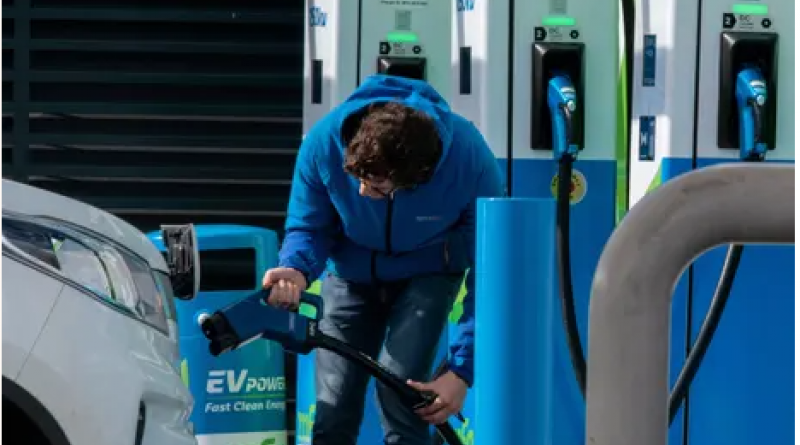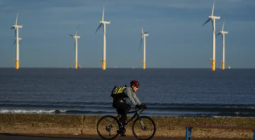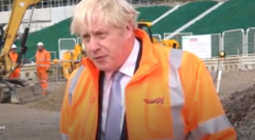All hail the net zero strategy: a year late and lacking in both ambition and funding

The UK rushed out its climate plan just days before Cop26 – and it shows. The planet can’t afford further bluster and delay
In politics, timing is everything. Last week the government set out its strategy for meeting its net zero carbon targets: this came a year later than expected, and less than a fortnight before the UK finds itself front and centre on the global stage as host of the Cop26 UN climate talks in Glasgow.
The long-awaited climate blueprint covered wide-ranging “net zero” ambitions from renewable energy and electric vehicles to carbon capture and electric heat pumps – and yet still offered too little, if not entirely too late.
It falls short in two crucial areas: ambition, and government funding. Critics say the carbon savings set out in the paper will not get the UK close to its net zero goal by 2050, and that without the funds might fail to meet even this limited ambition.
Chris Stark, chief executive of the Committee on Climate Change, said the success of the government’s net zero plans would rely on ministers putting in place major and at times expensive policy changes.
Timing is crucial in the race to tackle the climate crisis too – but one can’t help wondering whether the countdown to Cop26 meant officials didn’t have the time to put together policies with the depth, detail and Treasury buy-in to meet the deadline, despite a year’s delay. Delays beget further delays, and in the context of the climate crisis, the truism that winning slowly is the same as losing is all too apt.
The government hopes that alongside its plan to end the UK’s contribution to global heating it will create up to 440,000 jobs and “unlock” £90bn in private sector investment in the next decade alone. But it could all be at risk if the “how?” at the heart of the UK’s climate plans remain unanswered.
If the government hopes to meet its targets, time taken today on the details of tomorrow would be well spent. Take nuclear power: the ambition to bring forward investment in a new generation of nuclear reactors is almost 20 years old and has been wildly delayed. In the latest net zero strategy, the government vowed to secure a final investment for one large-scale nuclear power plant by the end of the parliament, but offered no new way to achieve this challenge.
Legislation for a new funding framework to meet the challenge of eye-watering upfront costs for nuclear is expected to emerge “very shortly”, according to one Whitehall source, but did not do so in time for the net zero strategy.
For households, the upfront cost of new low-carbon heating and insulation represents a challenge on a far smaller scale than the nuclear dilemma – but one with major cumulative implications for the UK’s climate goals, and in need of a coherent plan.
The government’s flagship home insulation scheme, the Green Homes Grant, collapsed earlier this year after failing to deliver the promised energy efficiency boom amid accusations that it was fatally rushed and poorly thought through.
This does not bode well for the government’s high-profile promise to make grants of £5,000 available to around 90,000 homes over the next three years for electric heat pumps, a low-carbon technology that can be hugely effective in keeping homes toasty – if the home in question is properly insulated.
Perhaps a plan to replace the Green Homes Grant, like the plan to fund new nuclear reactors, just wasn’t quite ready to include in the net zero strategy as part of a comprehensive plan to cut emissions from British homes.
Either way it’s high time the government began to set its deadlines by the pressing need for climate action rather than by political optics.
Forget Tesla: SpaceX will put a rocket under Musk’s wealth
Could Elon Musk become the world’s first trillionaire? Morgan Stanley, the investment bank, reckons so, and not from his hugely successful electric car company Tesla, but from SpaceX: the rocketship company that he – seriously – hopes will allow humans to colonise Mars.
It may sound crazy, but Morgan Stanley analyst Adam Jonas explains that SpaceX has the potential to expand from a single company into four whole new industries: space travel, space infrastructure, Earth observation and deep-space exploration.
If talks aimed at tackling the climate crisis at Cop26 later this month collapse and temperatures continue to steadily rise, maybe an escape to Mars will be the best option for survival for future generations (if they can afford a ticket). The world’s wealthiest people would be beneficiaries of such a crisis, as Musk, Jeff Bezos (who owns Blue Origin), and Richard Branson (Virgin Galactic) are the sole competitors in the race to commercialise spacecraft.
Musk, 50, is in pole position. As Jonas puts it, SpaceX is “challenging any preconceived notion of what was possible and the timeframe possible, in terms of rockets, launch vehicles and supporting infrastructure”.
To date, Musk, who is already the world’s richest person, with a $241bn paper fortune, has made most of his fortune from Tesla.
The company has a market value of $905bn - that’s more than the next six biggest traditional carmakers combined, despite the company only producing 900,000 cars a year. Toyota produces nine million.
Despite Tesla’s success – the shares have risen by 960% since the beginning of the pandemic alone – Jonas says it will be SpaceX that lifts Musk to a 13-figure fortune. He reasons that SpaceX has far greater disrupter potential than the highly disruptive Tesla, and points out that Musk owns about half of privately held SpaceX, compared with about a fifth of the carmaker.
Jonas asked his clients which stock they would prefer to bet on from here. About 63% plumped for SpaceX, with one predicting that it “may eventually be the most highly valued company in the world – in any industry”.
Red meat of politics leaves little appetite for cutting beef consumption
The necessity for reducing meat and dairy consumption is undeniable. But pork barrel politics is about dishing out the cash to try to win elections – it is not about putting taxes on sausages.
And so it was that Downing Street once again swiftly denied that it was planning to introduce a meat tax, after a proposal was published and then withdrawn within a few hours last week.
Tory MPs were quick to publicise their opposition, giving the impression that it remains anathema to them. “I’m a huge meat eater. I think it is wonderful,” said Conservative MP Tom Hunt.
The government’s climate change advisers say meat and dairy consumption must fall by at least 20% per person by the end of the decade to keep the UK on track to meet its net-zero targets.
Yet the practicalities of using a tax to achieve that drop remain unclear, especially as the carbon footprint can vary greatly depending on the type of meat, and where and how it is produced.
Beef requires significantly more land and water, and produces more climate emissions, than chicken, for example, while cattle raised on deforested land are responsible for many times more greenhouse gas emissions than animals reared on natural pastures.
A tax on meat could encourage more people to switch to vegan or vegetarian alternatives, but could also lead to an increase in cheaper meat imports. And there are concerns about potentially restricting access to a source of protein, vitamins and minerals.
None of this, however, need prevent politicians from helping to win greater public support for the necessity of cutting meat consumption. Nor is there anything to stop them subsidising alternatives to meat or introducing meat-free days more widely in schools and the public sector.
But for now, neither the Tories nor Labour – which is desperately trying to gain rural and farming votes – appear willing to start winning hearts and minds on the imperative of a meat reduction strategy.
24 October 2021
The Guardian




